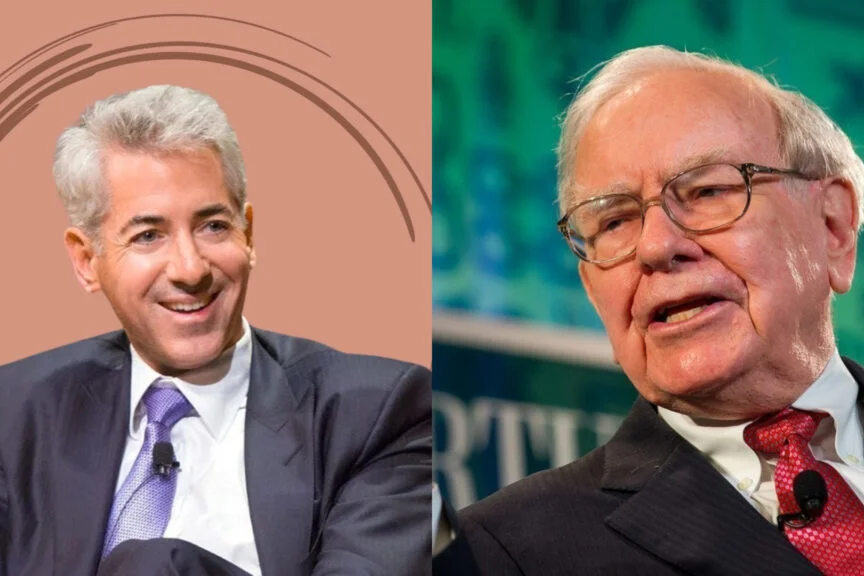Bill Ackman and Warren Buffett: The $700 Million Question on Leverage
It was 1994, and the Berkshire Hathaway annual meeting was as lively as ever—a congregation of hopefuls, skeptics, and financial minds all keen to absorb the wisdom of Warren Buffett. Among them stood Bill Ackman, a young hedge fund manager unafraid to ask tough questions. His inquiry would cut through the pleasantries and dive headfirst into the thorny issue of leverage, zeroing in on the precarious position of Salomon Brothers.
“What is the appeal of the business to you, given its leverage of 30-to-1 and relatively modest returns on equity?” Ackman’s voice carried a mix of curiosity and skepticism.
The room fell silent, all eyes on Buffett. The Oracle of Omaha didn’t flinch. His response came with a measured calmness, but it was clear he understood the gravity of the question.
Buffett admitted the risks inherent in Salomon Brothers’ high leverage but shifted the focus to what he believed mattered most: leadership. He highlighted the efforts of key players like Deryck Maughan, Bob Denham, and John McFarlane, who had stepped up during the firm’s darkest hours.
“The test will be whether they control the business in a way that leverage doesn’t prove dangerous,” Buffett said, his tone betraying a cautious optimism. He acknowledged that businesses operating with significant leverage need higher returns on equity to justify the risk, but he placed his bet on the caliber of the team leading Salomon.
The Rise and Fall of Salomon Brothers
Salomon Brothers wasn’t just another Wall Street firm. Founded in 1910, it became a titan in fixed-income trading, a pioneer that reshaped the market. But for all its successes, its history was pockmarked with scandals and crises.
The cracks began to show in 1987, when Salomon posted a $70 million loss linked to junk bond trading—a prelude to the infamous market crash. Things only worsened when its traders were caught submitting fraudulent bids for Treasury bonds. This wasn’t just a slip-up; it was a seismic scandal that shook the company’s foundation.
Buffett entered the fray in 1991, injecting $700 million into Salomon Brothers in a bid to stabilize the floundering firm. It was a bold move, but one that quickly turned sour. A third of his investment was wiped out in the fallout from the controversy.
Rather than cut his losses, Buffett took the reins. For nine intense months, he personally oversaw the company, rooting out the bad actors and restoring order. His hands-on leadership paid off. By the time Salomon was sold to Travelers Companies Inc., Buffett had not only salvaged his investment but also walked away with a doubled return.

MSI Gaming GeForce RTX 3060 12GB 15 Gbps GDRR6 192-Bit HDMI/DP PCIe 4 Torx Twin Fan Ampere OC Graphics Card

NVIDIA GeForce RTX 3070 8GB GDDR6 PCI Express 4.0 Graphics Card – Dark Platinum and Black

PNY GeForce RTX™ 4060 Ti 8GB XLR8 Gaming Verto™ RGB Triple Fan Graphics Card DLSS 3 (128-bit, PCIe 4.0, GDDR6, HDMI/DisplayPort, Supports 4k, 2 Slot)
A Legacy of Resilience
The story of Salomon Brothers didn’t end with Buffett’s departure. Travelers merged it with Smith Barney to form Salomon Smith Barney, a financial juggernaut that eventually became part of Citigroup. Over the years, the Salomon name faded into history, its legacy absorbed into the sprawling operations of Citigroup. By the mid-2000s, it was gone entirely.
Yet, for all its drama and decline, Salomon Brothers remains a case study in risk, reward, and redemption. Buffett’s involvement wasn’t without its costs, but his ability to navigate the storm underscored his unique approach to investing.
Buffett’s Wisdom on Leverage
Buffett’s experience with Salomon Brothers is a masterclass in handling leverage. He understood its double-edged nature: leverage can amplify gains but also magnify losses. His willingness to step in, trust in leadership, and take calculated risks speaks volumes about his investment philosophy.
For investors, the lesson is clear. Leverage isn’t inherently bad, but it’s a force that demands respect. More importantly, the people at the helm—their integrity, competence, and commitment—can make or break a business. Buffett’s bet on leadership proved prescient, even in the face of staggering odds.
Take Control of Your Investments
Are you inspired by Buffett’s bold decisions? Take your portfolio to the next level with expert insights and curated investment strategies. Sign up for Benzinga Edge today and gain access to Wall Street-level analysis and dependable stock picks. Start building your financial legacy now!
Homeless man and couple ‘completely made up’ viral story that raised $400,000



